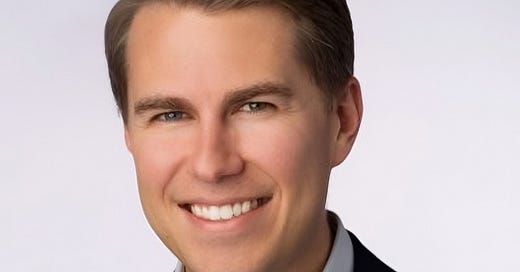“The thing I was indexing for at every single stage was, where can I do the most good to protect the country against something very bad?”
This is the question Miles Taylor asked himself at every turn. As the Chief of Staff to the United States Secretary of Homeland Security, Miles was privy to the inner workings of the Trump administration from 2017 to 2019. During that time, this national security official was involved in debates regarding the administration’s immigration policies (including the family separation policy), and personally witnessed the former president offer Homeland Security staff federal pardons for any criminal prosecution arising from their actions in stopping illegal immigration. When I spoke with Miles for the latest episode of On Leading, we talked about the increase in tribalism and polarization in our national politics, remaining anonymous versus taking your mask off, including his own personal transformation, and his desire for other Republicans to courageously speak their truth and lower the “price of dissent for others”.
If you don’t know by now, Miles Taylor was the senior official who anonymously sounded a five-alarm warning in the NYT Times op-ed “I Am Part of the Resistance Inside the Trump Administration“. He is also the Distinguished Service Medal recipient who anonymously penned the bombshell NYT bestseller A Warning (2019). In May 2022, he became the first former Trump administration official to publicly leave the Republican Party and endorse Joe Biden. In July 2023, he released his second book, Blowback: A Warning to Save Democracy from the Next Trump.
This brilliant mind—he’s a triple scholar with two Bachelor degrees in International Security and Political Science, plus a Master of Philosophy in International Relations from Oxford—rose quickly and naturally to leadership. After leaving his hometown of Laporte, Indiana in 2007, Miles worked for the US Department of Defense on European/NATO policy and as a White House intern in the office of former Vice President Dick Cheney. That was followed by two years with an advisory firm specializing in security and risk management. Then time in the Office of the Speaker of the House of Representatives and the Office of the Secretary of the Department of Homeland Security, culminating in a couple of years as chief speechwriter and national security advisor on counter-terrorism and foreign policy for Michael McCaul. You could say that, up until Miles wrote that now famous op-ed, his entire professional life had been directed toward government’s mission: the advancement of human freedom.
“If I learned one thing, it’s that it really is never too late to do the right thing.”
In 2019, Miles joined the Council on Foreign Relations, a century-old independent and nonpartisan American think tank specializing in U.S. foreign policy and international relations. Running up to the 2020 election, he was also active as Google’s Head of National Security Policy Engagement and their Head of Advanced Technology & Security Strategy. After Trump lost the election, he stepped down from the roles at Google and soon stepped up to lead Renew America, a movement to support “rational” Republicans and moderate Democrats in the 2022 mid-term elections and steer power away from pro-Trump GOP members. (Renew America subsequently merged with the Serve America Movement and the Forward Party to create Forward, a new political party that represents Americans who are done with the extremism, division and dysfunction of the existing political system.) In 2022, Miles became a council member for RepresentUs, the country’s leading non-partisan anti-corruption organization (check out my conversation with its founder Josh Lynn) and Business for America, a coalition of business leaders and companies promoting a government that works for all Americans.
Key Takeaways
Miles is one of the most courageous men I know. As perhaps the most famous whistleblower of our times, he has lived with immense stress the last few years. When we spoke in September 2023, he candidly shared why he chose to unmask himself and “go public” with the stand he took for the future of the United States and why these times call for us to unmask ourselves. Here are the highlights of our conversation:
Tribalism is at the center of the polarization in our national politics. It is often hard for people to see there are other tribes, including a tribe of the tribe-less, when they’re living inside of a cult.
The problem isn’t in Washington: the problem is in our city streets. Our streets are the frontline in the struggle for the soul of this country. That is where everyday Americans need to start having those honest conversations that they would normally avoid out of cowardice.
People remain anonymous for a long time because they fear being cast out of their tribe. They are scared to speak out for fear of being “cancelled”. They fear that stating their true opinions about politics in their own communities, even in their own families, will get them silenced. They’d rather be dead. And so they self-censor.
There is life on the other side of a right decision. The only way to get over that fear of losing your tribe is to look past your current tribe and see there is a tribe of the tribe-less, a community of folks who are willing to make the right decisions. You really don’t have to live inside of a cult of wrong decisions forever.
Coming forward lowers the price of dissent for others. There really is strength in numbers. In our society right now the price of stating your true opinion publicly and standing up against something that is wrong is very high. Multiple tribes can condemn you. You can have your whole life taken away from you. Ultimately, we don’t want to decrease the demand for truth tellers. The only option we have to reduce the price of speaking out is to increase the supply of dissent.
No one can take away your tests. Opportunities to have your metal tested, to make moral decisions, and to decide where you stand don’t come often in life. No matter what comes from the choices you make in those moments, no one can take those opportunities, those tests, from you.
The decision to unmask yourself—or not—comes down to internal factors. I knew it was going to be a shit show when I came forward and went public. I knew it could literally cost me everything. I knew, if I left my job, someone else could step into it and say “yes” to doing things that were illegal. Ultimately, the decision came down to one question: “If I decide not to go public, if I decide not to do anything about what I’m seeing, do I think I can live with myself?” I didn’t want to wake up every day and see a guy in the mirror who was a complete and total coward. It doesn’t matter that my choice has cost me my job, my home, my personal security, my family’s security, my life savings, and the relationship I was in. The moral relief alone has been invaluable.
Ignore guardrails and you risk self-destruction. This applies just as much to us as individuals as it does to our democracy. In my case, an addiction to alcohol, which I relied on to mask all of the stress I was experiencing, could have been my downfall. Fortunately, I had someone in my life who was courageous and straight with me about what they saw happening. In the case of our democracy, we are letting a loud minority of folks openly debate about the destruction of our institutions and the things that should protect us from a populist figure taking control. That puts our whole country in danger, and so I speak to these guardrails in my book Blowback.
Social media has made open warfare between political sides possible. If humans have learned anything from international conflict over the centuries, it’s that the most brutal wars happen when one side fully dehumanizes the other. It becomes easy to kill “the other side” because you no longer see them as human beings. Today we can lob digital grenades over the online wall at people we cannot see, touch or hear. This dehumanization is a problem amplified by technology—and it will have to be solved by technology.
“My hope is that we push our tools and technologies to guide our daily lives to be more human so that they make it harder to treat people in a dehumanized way.”














Share this post